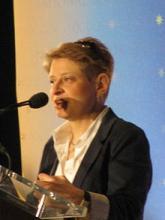Neoliberalism's Final Stronghold
BERKELEY – The past decade has not been kind to neoliberalism. With 40 years of deregulation, financialization, and globalization having failed to deliver prosperity for anyone but the rich, the United States and other Western liberal democracies have seemingly moved on from the neoliberal experiment and re-embraced industrial policy. But the economic paradigm that underpinned Thatcherism, Reaganomics, and the Washington Consensus is alive and well in at least one place: the pages of the Economist.
A recent essay celebrating America’s “astonishing economic record” is a case in point. After urging despondent Americans to be happy about their country’s “stunning success story,” the authors double down on condescension: “The more that Americans think their economy is a problem in need of fixing, the more likely their politicians are to mess up the next 30 years.” While acknowledging that “America’s openness” brought prosperity to firms and consumers, the authors also note that former President Donald Trump and current President Joe Biden “have turned to protectionism.” Subsidies, they warn, could boost investment in the short term but “entrench wasteful and distorting lobbying.” In order to address challenges like the rise of China and climate change, the US must “remember what has powered its long and successful run.”
As usual, the Economist delivers its reverence for neoliberal dogma with all the sanctimony and certitude of a true believer. Americans must sit down, shut up, and recite the catechism: “The market giveth, the market taketh away: blessed be the name of the market.” To doubt that the US economy’s current problems are caused by anything other than an interventionist, overbearing government is apostasy. But, as an economic historian, what took my breath away was the essay’s conclusion, which attributes America’s postwar prosperity to its worship of the Mammon of Unrighteousness (more commonly known as laissez-faire capitalism).
The essay cites three “fresh challenges” facing the US: the security threat posed by China, the need to rejigger the global division of labor due to China’s growing economic clout, and the fight against climate change. The climate challenge, of course, is hardly “fresh,” given that the world is at least three generations late in addressing it. Moreover, our failure to act promptly means that the economic impact of global warming will likely consume most, if not all, of the world’s anticipated technological dividends over the next two generations.
From a neoliberal perspective, these challenges are considered “externalities.” The market economy cannot address them because it does not see them. After all, preventing a war in the Pacific or helping Pakistan avoid destructive floods by slowing global warming does not involve financial transactions. By the same token, the collaborative research and development efforts of engineers and innovators worldwide are the primary drivers of absolute and relative economic prosperity. But they, too, are invisible to the calculus of the market.
Recognizing the scale and urgency of global challenges such as climate change and then denying, as the Economist does, that only governments can effectively address them amounts to something resembling intellectual malpractice. Adam Smith himself supported the Navigation Acts – which regulated trade and shipping between England, its colonies, and other countries – despite the fact that they mandated that goods be transported on British ships even if other options were cheaper. “Defense,” he wrote in The Wealth of Nations, “is of much more importance than opulence.” Denouncing desirable security policies as “protectionist” was beside the point then and now.
Moreover, the Economist’s denunciation of Biden’s alleged protectionism is accompanied by the ambiguous observation that “the politics of immigration have become toxic.” In fact, there are only two options: The US should either welcome more immigrants (as I believe it must), because they are highly productive and quickly integrate, or it must restrict immigration because some believe that the assimilation process is too slow. By remaining vague, the authors punt, perhaps hoping to leave readers on both sides of the issue convinced that the Economist shares their views.
The essay’s observation that subsidies could “boost investment in deprived areas in the short term” but also “entrench wasteful and distorting lobbying” in the long run is similarly equivocal. The underlying claim appears to be that while market failures caused by externalities are bad, the potential consequences of government policies aimed at correcting them are worse. Americans’ safest bet is simply to keep faith with the market.
The Economist’s argument reflects a fundamental misunderstanding of US history. The American economic tradition is rooted in the ideas of Alexander Hamilton, Abraham Lincoln, Teddy and Franklin Roosevelt, and Dwight Eisenhower, who recognized the need for a developmental state and the dangers of rent-seeking.
To be sure, it has been 70 years since Eisenhower’s presidency, and much of America’s state capacity has been hollowed out during the long neoliberal era that began with the election of Ronald Reagan. But the laissez-faire policies that were woefully inadequate for the mass-production economy of the 1950s are an even worse fit for the biotech and IT-based economy of the future. Rather than reject Biden’s industrial policies, Americans should embrace them. To quote Margaret Thatcher, there is no alternative.
J. Bradford DeLong, a former deputy assistant US Treasury secretary, is Professor of Economics at the University of California, Berkeley, a research associate at the National Bureau of Economic Research, and the author of Slouching Towards Utopia: An Economic History of the Twentieth Century (Basic Books, 2022).
Copyright: Project Syndicate, 2023.
www.project-syndicate.org
This article is brought to you by Project Syndicate that is a not for profit organization.
Project Syndicate brings original, engaging, and thought-provoking commentaries by esteemed leaders and thinkers from around the world to readers everywhere. By offering incisive perspectives on our changing world from those who are shaping its economics, politics, science, and culture, Project Syndicate has created an unrivalled venue for informed public debate. Please see: www.project-syndicate.org.
Should you want to support Project Syndicate you can do it by using the PayPal icon below. Your donation is paid to Project Syndicate in full after PayPal has deducted its transaction fee. Facts & Arts neither receives information about your donation nor a commission.





















